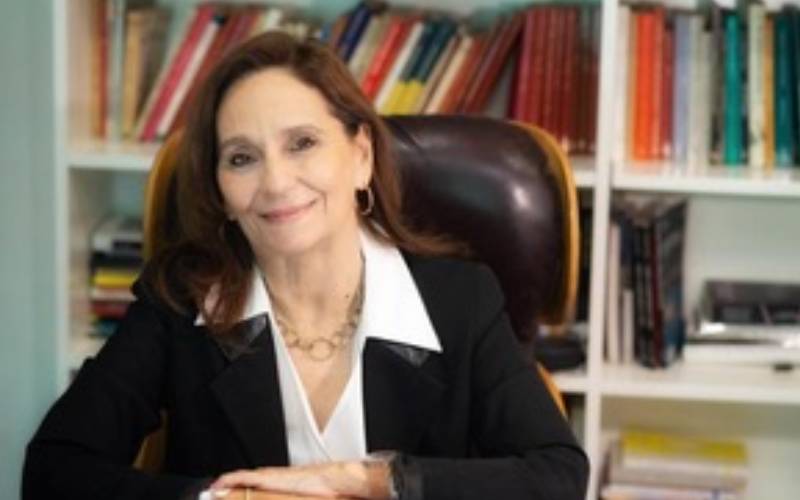“I think it is very interesting to open a debate and talk about this impact of the culture, this epoch, in the subjectivity and never losing the internal work within psychoanalysis, within our consulting room. So when I quote the Lacanian way of saying the ‘declination of the father’s name’, I am talking about these times, this epoch, in which the reference and the subjectivity fails in respecting what we can call ‘the authority’. But ‘the authority’ means not authoritarian systems – it is the law, it is the possibility of symbolization, and it’s the way of being free too, because without some limits you cannot be creative, you cannot be open to symbolization. We are talking about how the ‘other’ is working in this new social environment and how this evanescence of the father’s name is part of a situation that leaves open to the death drive.”

Gabriela Goldstein, Ph.D.
Buenas Aires
Episode Description:
We begin with recognizing the aspects of chaos that surround us in the real-world. Gabriela takes us from there into the chaos that often lives internally. She then addresses the clinical space which allows for its emergence through the dyad. She speaks of the evanescence of the father’s name, authority vs authoritarianism, the ‘halo of metaphors’ and the nature of the analyst’s ‘open form’ of clinical engagement. Gabriela describes analytic cure as “step by step, so that love and not revenge for pain predominate.” She shares with us her early life involving her child analysis, her study of architecture and her now working as an analyst and a painter.
Linked Website:
Our Guest:
Gabriela Goldstein, Ph.D. Past President of APA (2020-2023). Training analyst of Argentina Psychoanalytical Association (APA), and the International Psychoanalytical Association (IPA) and FEPAL. Doctor Ph.D in Psychology (Universidad del Salvador). Books include The Aesthetic Experience, Writings on Art and Psychoanalysis, and Art in Psychoanalysis. Co-author, among others, of the APA book Dreams and Perception APA Editorial and the book Dear Candidate Fred Busch edit. She has won the Mom-Baranger prize for best monograph in Psychoanalysis with The Aesthetics of Memory, Freud at the Acropolis and won the A. Storni prize for conceptual contributions in Psychoanalysis with Transience, or the Time of Beauty. She has served on many IPA and APA committees including the IPA and Culture Committee since 2007. In addition, Gabriela is both an architect and a painter. Since 1985 she has taken part in solo painting exhibitions in Argentina as well as collective exhibitions in museums, art galleries, and cultural centers in Italy, France and Germany. She lives and works in Buenos Aires.
Recommended Readings:
Baranger, W. y M. (2012). La situación analítica como campo dinámico. Revista de Psicoanálisis. 69(23), pp. 311-352
Bush, F. (editor) (2021) Dear Candidate: Analysts from Around the World Offer Personal Reflections on Psychoanalytic Training, Education and the Profession. Routledge. London and New York.
Freud, S. (1919) “The Uncanny” The Standard Edition of complete psychological works of S. Freud, V 17
Goldstein, G (2013) Art in Psychoanalysis, A Contemporary Approach to Creativity and Analytic Practice, Karnak-IPA
Goldstein G. (2022): “La no respuesta del Otro: algunas cuestiones sobre la cura” Revista de Psicoanálisis de la Asociación Psicoanalítica Argentina, LXXIX-3-4
Goldstein, G (2022): “Los misterios de la creación: Entre cuerpo y cultura”, Revista Uruguaya de Psicoanálisis ( on -line 135)
Mc Dougall, Andre, J., De M´Uzan, Et all,(2010) El artista y el Psicoanalista Ed. Nueva Vision
Winnicott, D.W. (1978). Winnicott, D.W., Green. A, Mannoni, O, Pontalis; J-B y otros
Winnicott, D. W. (1974): “Fear of breakdown” Int. Rev. of Psychoanalysis. (1974) l, 103

I listened to this podcast, and it was incredibly interesting, especially the part where you mentioned that psychoanalysis is about healing through love rather than responding with pain. Could you please send me the PDF of the paper? I couldn’t locate it on PEP.
Terrific interview & guest. I particularly enjoyed the discussion of engaging the patient’s curiosities, opening the field, using the analysts own associations to do so. I suspect, as with many technical matters this has always been done, even in so called transference only analyses, despite ardent claims to the contrary. Dr. Goldstein mapped out a through and beautiful approach to the analysis of unconscious, conscious, the interpersonal & reality via transference/countertransference w/ it’s aesthetic possibilities. Thank you & terrific! Martin